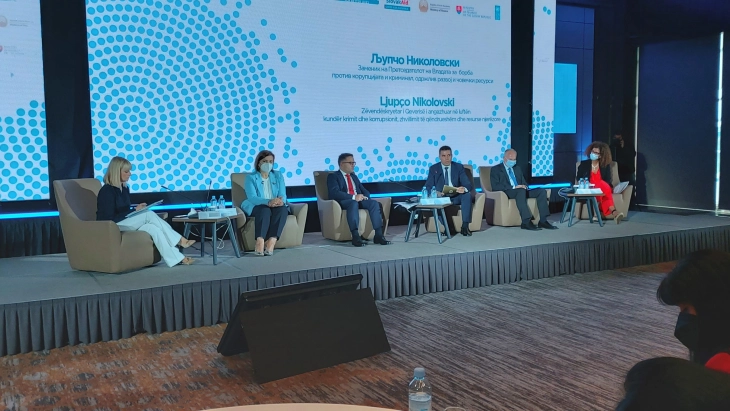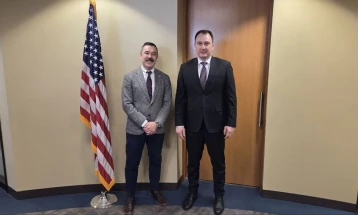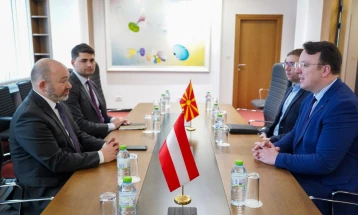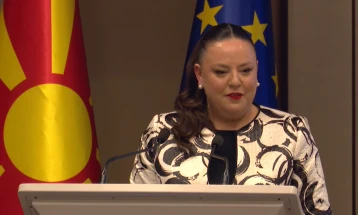Recognizing and Reducing the Informal Economy – a new project by the Ministry of Finance and the UNDP

Skopje, 22 September 2021 (UNDP/MIA) - Recognizing and Reducing the Informal Economy in the country by precisely mapping out the sectors where it is most prevalent and identifying he main causes for its occurrence — this is the aim of the “Public Finance Management Reform” Project, which was launched today by the Ministry of Finance and the United Nations Development Program (UNDP).
The main activities will focus on creating new and efficient tools to combat the informal economy. Within this project, national and international experts are already working on a study outlining the reasons and the indicators to reduce the informal economy, UNDP said in a press release.
“Taking steps to decrease the informal economy per se would be insufficient, unless we find a way to meticulously measure the effects of such steps. Therefore, a crucial aspect within the study is the development of indicators measuring the size and prevalence of the informal economy in the country. The indicators measuring the level of informal economy would serve to conduct an evaluation of the steps taken to address it, which would enable us to extend the measures that have given good results, as well as modify those who have failed to meet the expectations”, the Minister of Finance, Fatmir Besimi, pointed out.
The project will focus on practical actions and mechanisms in four priority areas, more specifically: improving the process of measuring, monitoring and detecting the informal economy, more effective inspection services, improved business environment for growth and development of businesses, and public awareness raising.
“Most citizens are not aware that the ‘invisible hand’ of the grey economy has a direct negative effect on the quality of their lives. That is why, we at UNDP are strongly committed to support the Government’s efforts to transform the national public finance management system and create a favorable business environment that would lead to a decrease in the informal economy in the country”, said Sanja Bojanic, UNDP Deputy Resident Representative.
The “Public Finance Management Reform” Project is implemented with the financial and expert support of the Ministry of Finance of the Slovak Republic and the Slovak Agency for International Development Cooperation.
“The program is based on the Slovak experience in the public finance reform and, in particular, the continuous introduction of new and effective tools. As part of the program, we provide technical assistance, based, above all, on the Slovak experience, but also the experience of other countries, especially when it comes to those areas that Slovakia does not have sufficient expertise in”, said Henrik Markus, Ambassador of the Slovak Republic to the country.
Deputy Prime Minister for Fight against Corruption, Ljupcho Nikolovski, emphasized that suppressing the informal economy requires a serious and thorough approach, as well as drafting measures and policies that would lead to eradication of this phenomenon.
“The Government’s 'Plan for the Fight Against Corruption' contains measures that would not only aid the ongoing fight against corruption, but also significantly contribute to the strengthening of the business sector and the business relations within it, and create conditions for unhindered functioning of companies based on market principles. The most recent measure that we are working on at the moment is the Law on Origin of Property - something that is being adopted for the first time in our country, and is important because it paves the way to confiscation of illegally gained property and has implications on the collection of taxes which then flow into the central budget. If the total property is lawfully gained and declared to the competent institutions, the owners would pay the taxes to the state, which would consequently lead to a decrease in the tax evasion”, Nikolovski emphasized.
Minister of Labour and Social Policy, Jagoda Shahpaska, informed that together with the Employment Service Agency they are working on Labour Market Activation. “Through an individual plan for every employable person, prepared by the Centers for Social Work together with the ESARNM, and through the up-skilling and re-skilling programs offered, we create conditions for every employable person, with the support of the institutions, to get an adequate job which would bring them livelihood and certainty”.
"Our goal through the Strategy for the Formalization of the Informal Economy 2018-2020 and the IPA Project 'Improving the Working Conditions', is to stimulate the creation of new formal jobs, decrease the number of unregistered jobs, but also provide an incentivize women to become active on the labour market. The State Statistical Office has marked a continual downward trend in the informal employment rate, from 24.3% in 2011, to 13.6% in 2020”, Shahpaska pointed out.
In order to have a more comprehensive and inclusive approach in the development of the study on the informal economy, the competent state institutions, agencies and inspectorates will be consulted in the process, along with the chambers of commerce, the trade unions and the NGO sector.







